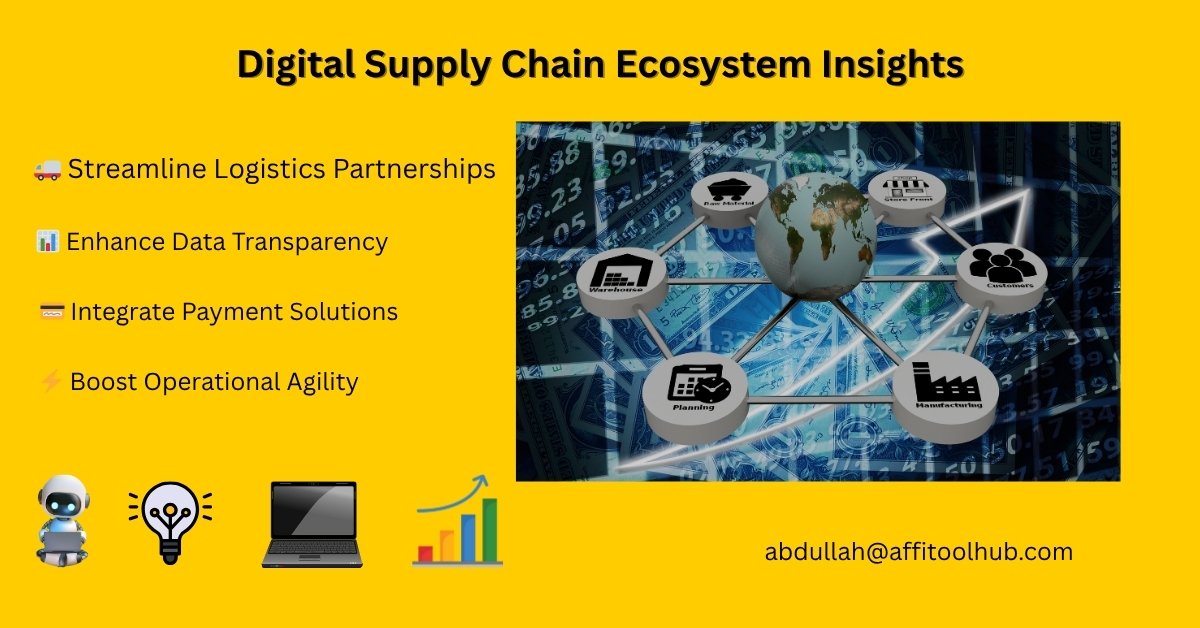The modern supply chain is no longer a linear, siloed process. It has transformed into a dynamic ecosystem of affiliated industries, each playing a critical role in delivering products and services to consumers.
In this article, we’ll explore how supply chain ecosystems in digital business function, why industry interconnectivity is vital, and how companies can leverage these ecosystems for operational excellence and competitive advantage.
What is a Supply Chain Ecosystem?
A supply chain ecosystem is a group of businesses, technologies, and service providers that work together to transport goods, information, and money quickly and easily. Ecosystems prioritize transparency, agility, and real-time responsiveness in contrast to conventional supply chains.
Crucial Elements of an Electronic Supply Chain Ecosystem:
- Manufacturers & Suppliers
- Logistics & Transportation Firms
- Platforms for e-commerce
- Fintech Services and Payments
- Companies that make technology (AI, Blockchain, IoT)
The Digital Change in Supply Chains
Digital technologies have completely changed the way supply chains work. For example:
- AI-driven demand forecasting makes it easier to manage your inventories.
- IoT sensors allow real-time tracking and predictive maintenance.
- Blockchain platforms make sure that transaction records are clear and can’t be changed.
Industries that are part of supply chain ecosystems
Logistics, packaging, fintech, and digital marketing are all closely related fields. For example, an e-commerce platform relies on logistics partners for delivery, payment gateways for transactions, and SEO firms to increase web traffic.
This is why organizations that want to improve their supply chain strategy need to know about related sectors.
For an in-depth look at how these affiliations support marketing strategies, read Affiliate Marketing Ecosystem Explained.
Benefits of an Integrated Supply Chain Ecosystem
Operational Efficiency: Streamlined operations cut down on lead times and costs.- Better Customer Experience: Real-time tracking and speedier deliveries make customers happier.- More flexibility: Ecosystems let organizations quickly adapt to changes in the market.- Making decisions based on data: Shared analytics tools let people make smart strategic choices.
Real-Life Example of Supply Chain Ecosystem in Action
The supply chain ecosystem at Amazon is a great example. It connects suppliers, fulfillment centers, last-mile delivery partners, and finance solutions to make sure customers have a smooth experience.
Challenges in Ecosystem Integration
Supply chain ecosystems have a lot of benefits, but merging various related industries might be hard:
Data Silos Across Industries:
Firms often keep data in systems that don’t work with each other, which makes it hard for ecosystem partners to share information.
Regulatory and Compliance Issues:
Each sector and region has its own set of rules and regulations, which makes it harder to do business across industries.
Aligning KPIs Among Ecosystem Partners:
Setting agreed goals and performance metrics across different industries is important but hard.
What will happen in the future with supply chain ecosystems
As digital ecosystems change, a few important trends are affecting the future of supply chains:
Predictive Analytics with AI:
AI will be very important for predicting demand, finding the best routes, and managing inventory before it runs out.
Smart Contracts on the Blockchain:
Blockchain will make transactions and agreements automatic, making supply chains more open, safe, and efficient.
Last-Mile Delivery with Drones:
Drones and self-driving cars will change last-mile delivery for the better, making urban logistics faster and cheaper.
The Role of Strategic Partnerships in Ecosystem Success
No supply chain ecosystem can thrive without effective collaboration between affiliated industries. Strategic partnerships enhance innovation, streamline operations, and expand market reach.
If you want to explore how these partnerships drive mutual growth, check out our detailed guide on Business Synergies through Industry Partnerships
Conclusion
Supply chain ecosystems are no longer optional—they are the backbone of digital business operations. Companies that effectively integrate affiliated industries into their ecosystem can achieve unmatched efficiency, scalability, and customer loyalty.
In an age where agility and innovation dictate success, businesses that leverage these ecosystems will outperform competitors who remain siloed.
To see how cross-sector partnerships amplify these efforts, read our blog on Cross-Industry Collaboration Strategies. Additionally, understand how cutting-edge technologies are reshaping supply chain ecosystems in Emerging Technology in Affiliated Industries.
For a comprehensive view of how these ecosystems support performance-based marketing models, visit Affiliate Marketing Ecosystem Explained.




